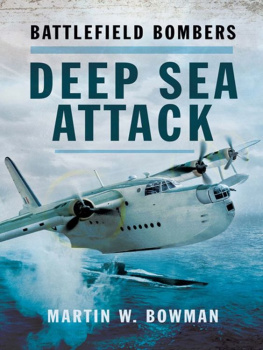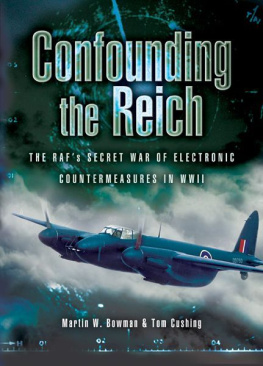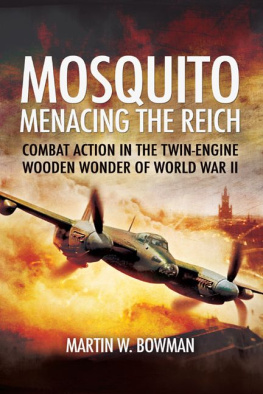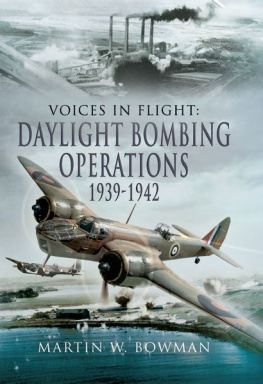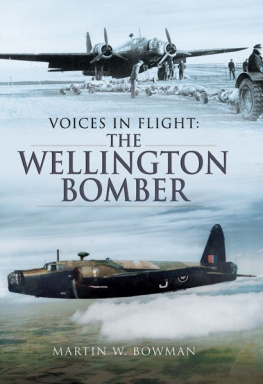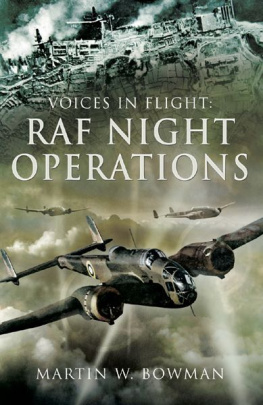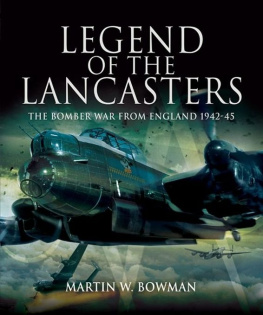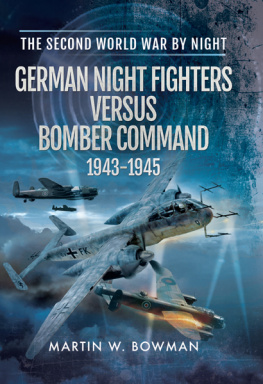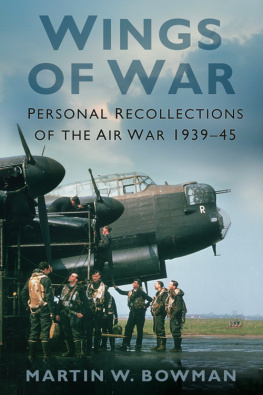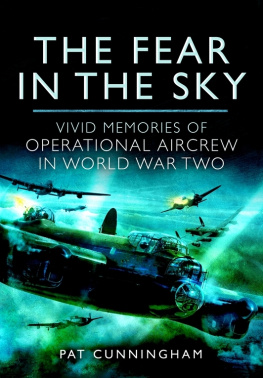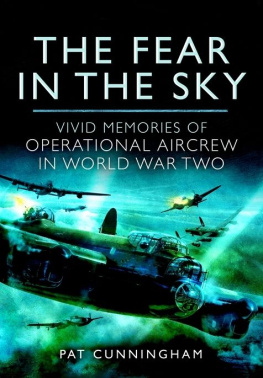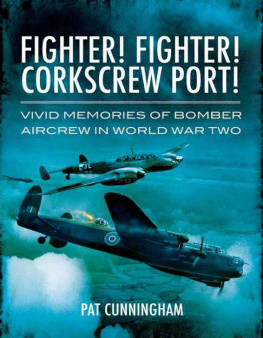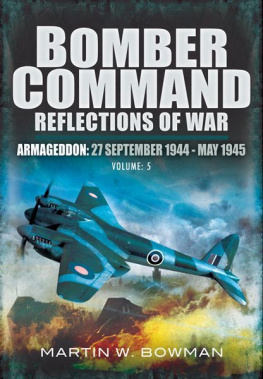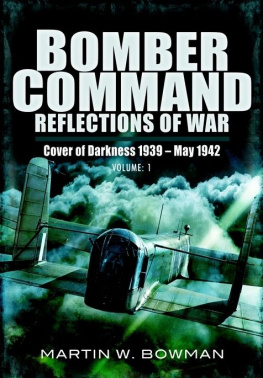
First Published in Great Britain in 2014 by
Pen & Sword Aviation
an imprint of
Pen & Sword Books Ltd
47 Church Street, Barnsley, South Yorkshire S70 2AS
Copyright Martin W Bowman, 2014
ISBN 9781783831975
eISBN 9781473841581
The right of Martin W Bowman to be identified as author of this work has been asserted by him in accordance with the Copyright, Designs and Patents Act 1988.
A CIP catalogue record for this book is
available from the British Library.
All rights reserved. No part of this book may be reproduced or transmitted in any form or by any means, electronic or mechanical including photocopying, recording or by any information storage and retrieval system, without permission from the Publisher in writing.
Typeset in 10/12pt Palatino
by GMS Enterprises
Printed and bound in England by
CPI Group (UK) Ltd, Croydon, CR0 4YY
Pen & Sword Books Ltd incorporates the Imprints of Pen & Sword
Aviation, Pen & Sword Family History, Pen & Sword Maritime, Pen & Sword
Military, Pen & Sword Discovery, Wharncliffe Local History, Wharncliffe
True Crime, Wharncliffe Transport, Pen & Sword Select, Pen & Sword
Military Classics, Leo Cooper, The Praetorian Press, Remember When,
Seaforth Publishing and Frontline Publishing.
For a complete list of Pen & Sword titles please contact
PEN & SWORD BOOKS LIMITED
47 Church Street, Barnsley, South Yorkshire, S70 2AS, England
E-mail: enquiries@pen-and-sword.co.uk
Website: www.pen-and-sword.co.uk
Contents
Acknowledgements
I am indebted to all the contributors for their words and photographs. Thanks also go to my fellow author, friend and colleague, Graham Simons, for getting the book to press ready standard and for his detailed work on the photographs; to Pen & Sword and in particular, Laura Hirst; and to Jon Wilkinson, for his unique jacket design once again.
Prologue
Task For Coastal Command
Hector Bolitho
The newspapers give too much space to the glory and heroics of war and not enough to the misery; the days of slow starvation in dinghies, the horrors of mutilation and the cries of men being burned. The mass mind fights shy of these things, naturally preferring the heroism. There is too much limelight on the gallantry, which encourages war and not enough on the despair and pain, which might put a mute on the trumpeters who cry, He died a hero. That he was a hero is merely incidental to the fact that he died in pain, that he was robbed of life and that he is lost to his generation. There is glory in living for an ideal as well as in dying for it .
The times when the aircraft should return from their night patrols seem to become fixed in my mind and I find myself waking from sleep in a state of wordless prayer. There is no adventure in the war for those who sit on the earth like this, with the fear of being called in the morning and told that another aircraft has been lost in the Channel. It means the sudden obliteration of ten men; men with whom I have walked along the beach, or shared pints with at The Travellers Rest.
The aircrews themselves are resilient when the bad news comes, but they are also vindictive. Their hatred of the German is not emotional. It is terrible with purpose. They go about their business hoping that next day will give them the chance of revenge but knowing that the crop of deaths among themselves is inevitable. My older heart. starts when I see the dismal ritual; the disappearance of faces from the mess table, the packing of the dead mans possessions, the pile of his luggage in the hall; and the new man, fresh from his training, walking up the stairs to occupy the empty room.
The professional service man pretends that he has conquered these feelings. Perhaps he has developed a crust of hardness which helps him. But five years of life on the edge of the service, of crossing so many names out of my loose leaf address book that it becomes more simple to start a new page for each letter, have left me as vulnerable to grief as I was in the beginning. Only two of the eleven pilots who ate my birthday lunch with me before the war are now alive.
This loss dismays me, of a generation mown down before they have known the richness of summer, before they could ripen and feed the world. They are so unmean, so just and so kind. I sat in the mess last night with three of them, talking of the dullness of the mess food. We each imagined the dinner we would like to eat and I whispered, Twelve oysters, the breast of a roast duck with apple sauce, new potatoes and peas picked an, hour before they are cooked, followed by a fresh peach which you could peel in one piece, like taking off a vest.
One of them said, Oh, thats cruel. I am hungry, lets make hogs of ourselves.
They all went to their rooms and brought back tins of food which we took into the kitchen. Between the four of us we ate a tin of sheeps tongues from New Zealand, spread on slices of thick toast and crowned with mustard pickles. Then we shared a tin of honey, also spread on buttered toast, a tin of peaches, two tins of cream and a cold pudding. It was their hoard of gifts, saved for several weeks and we ate them in sheer vicious greed.
We all felt rather sick afterwards, like the man who said, Ill tell you what I had to eat, if I can. We went to the edge of the cliff for air and my wretched conscience made me think of poor children who would have loved my share of the peaches. We sat in the moonlight and belched, looking down to the sparkling waves and watching the aircraft coming home. Then, for some reason, truth was released and I sat with my head in my hands, watching the three faces in the moonlight and listening to them talk without a hint of self-consciousness.
All three of them have had horrible experiences. One was shot down over the Mediterranean and he saved his aircraft and some of the crew in circumstances that won him the DSO. One had a fight against six Ju 88s and the other, who is a generous, good creature behind his noisy toughness, told us of a time when he switched on his torch in an aircraft and the light fell on what had once been a human face. These are the experiences which affect their thoughts, not the opportunities for glamour. Each one of them admitted that he finds himself recalling his horrible experience as he lies in bed. And each one of them admitted the menace of fear.
I think the popular picture of the aircrew dying for their country in the flash of heroism is false. It is a bad seed to sow for the future. I do not believe that they fight for nationalism or for that old carrot dangled before their nose in the name of freedom. They know that nationalism is a defunct aim and that freedom cannot be won with swords -it can be bred only within each man by the development of his integrity.
The real heroism of the aircrews of Coastal Command lies in their patience; in their capacity to survive the dark hours of vigilance. They loathe the false light that is shed on their occasions of victory. I saw this so clearly the other day when the broadcasting man brought his van here to make one of them speak. As a writer I felt that it was my duty to help the broadcasting man, but as a member of the service I knew it was my instinct to hold back. The pilot was not merely indignant. He was sick with confusion.
I am often alarmed when I hear Australians and New Zealanders talk anxiously of their chances when they return home. They seem suspicious of government promises that they will be cared for and taken back into commerce and industry. Also, Australians and New Zealanders seem unconscious of their value; of the store of experience and judgment they will take back with them, not only because their courage has been proved but also because of the widening of their mental horizon. Those who have been here three or four years realize that however independent the new countries have become, their roots lie in Britain. Some of them yearn to go home soon because they are poor travellers and unwilling to learn, but most to whom I speak realize that their language, their civic consciousness, their democratic intentions and their integrity owe a debt to the English system.
Next page
